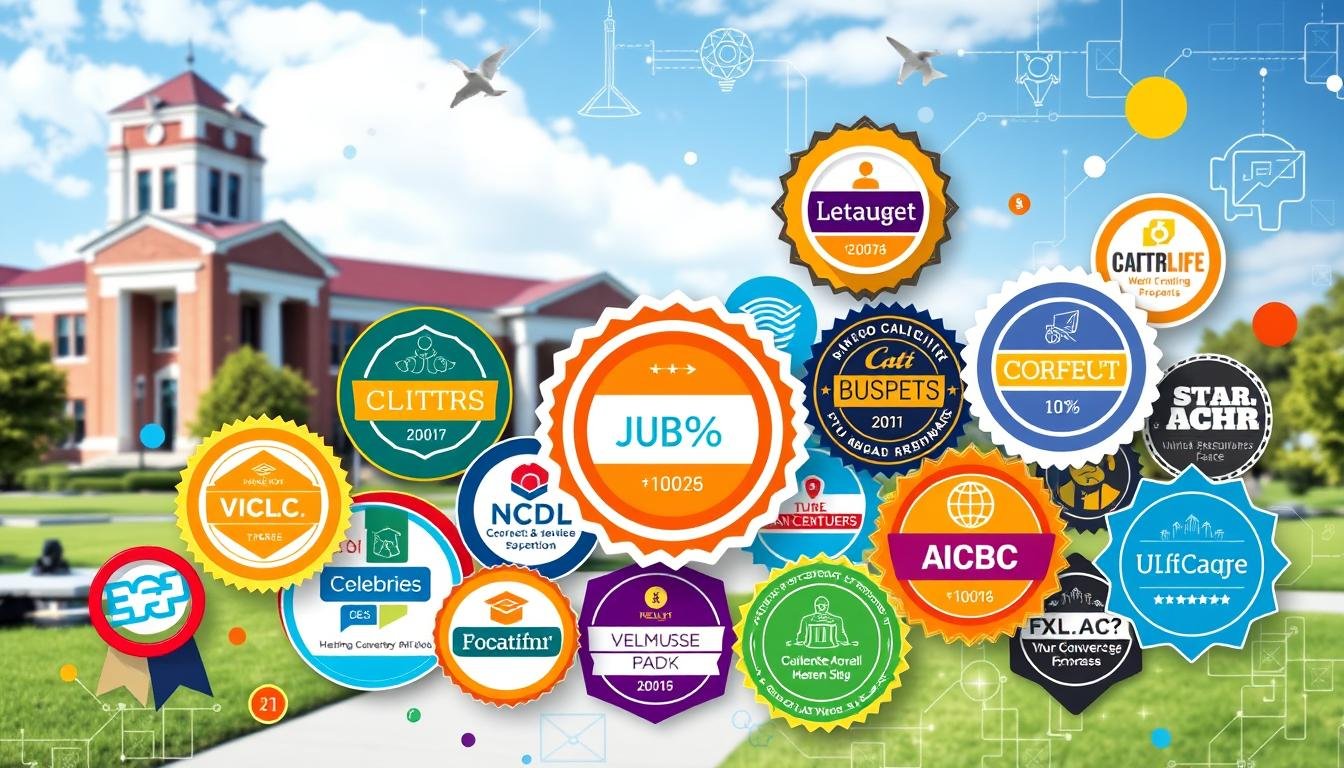In today’s competitive job market, employers are seeking entry-level talent with not just the right degrees, but the specific skills and hands-on experience needed to excel in their roles. As a result, higher education institutions are evolving their curricula to ensure graduates are equipped with the most sought-after capabilities. But how can you, as a master’s degree holder, differentiate yourself and show you possess the job-relevant skills employers crave? The answer may lie in the rising trend of micro-credentials.
What are micro-credentials, and how can they complement your advanced degree to boost your career prospects? This article will explore the evolving job market, the value of micro-credentials, and strategies for leveraging your education and expertise to negotiate relocation packages, secure higher compensation, and achieve long-term career success.
Key Takeaways
- Micro-credentials are short, targeted certifications that focus on specific industry skills and knowledge
- Employers increasingly value micro-credentials as they demonstrate job-relevant expertise beyond a traditional degree
- Micro-credentials can complement your master’s degree, showcasing your commitment to continuous learning and adaptability
- Strategically earning micro-credentials can enhance your job search, relocation negotiations, and long-term career growth
- Micro-credentials offer flexibility and affordability, allowing you to upskill and stay competitive in the evolving job market
The Evolving Job Market and Skills Demand
As the job market continues to evolve, employers are seeking candidates with a diverse set of job-relevant skills. In particular, the growing demand for digital skills has led organizations to prioritize candidates proficient in areas like cybersecurity, project management, digital marketing, and data visualization. A recent survey revealed that 90% of students agree that earning entry-level professional certificates can help them stand out to employers and secure jobs upon graduation.
Employer Expectations and Entry-Level Talent
In the face of the skills gap, higher education leaders are recognizing the need to bridge the divide between employer expectations and entry-level talent. In fact, 93% of these leaders agreed that offering non-degree credentials, including micro-credentials, can help their institutions combat declining enrollment numbers and open up new revenue streams.
The Need for Job-Relevant Skills and Experience
As the evolving job market continues to shape the landscape of in-demand skills, individuals seeking to secure their first job or advance their careers must strive to acquire the necessary job-relevant skills and experience. This emphasis on practical, industry-aligned knowledge has become increasingly crucial for success in the modern workforce.
Introducing Micro-Credentials
In the ever-evolving job market, employers are seeking candidates with not just degrees, but also specialized skills and competencies. This is where micro-credentials come into play. Micro-credentials are certified documents that provide recognized proof of the achievement of learning outcomes from shorter, less extensive educational or training activities.
Definitions and Types of Micro-Credentials
Micro-credentials focus on the validation of competency-based skills, outcomes, and/or knowledge using transparent standards and reliable assessments. They can be credit-bearing or non-credit, and may or may not be stackable towards larger units of accreditation, such as a degree or diploma.
Affordances and Barriers of Micro-Credentials
Micro-credentials offer the opportunity to enhance employability and address specific skills gaps. They provide a flexible, targeted way to demonstrate expertise and stay competitive in the job market. However, micro-credentials also face some barriers, such as the need for standardization and accrediting oversight to ensure their credibility and recognition by employers.
The Global Landscape of Micro-Credentials
As the demand for job-ready skills continues to rise, the global micro-credentials landscape is undergoing a dynamic transformation. Across various regions, educational institutions and policymakers are actively exploring the potential of micro-credentials to address skills gaps and enhance career opportunities for students.
In Australia, the Micro-credentials Marketplace offers a centralized platform for universities to deliver industry-recognized micro-credentials, catering to the evolving needs of the workforce. Meanwhile, in the United States, the University of Texas System and the University of Arizona are leading the charge, integrating micro-credentials into their curricula, particularly in technology-related fields.
Farther north, Canada and Europe are also actively embracing the power of micro-credentials. These regions are recognizing the value of these flexible, skill-focused learning opportunities to bridge the gap between education and the demands of the job market.

As the global micro-credentials landscape continues to evolve, regional approaches are emerging, each tailored to the unique needs and challenges of their respective economies. By harnessing the versatility of micro-credentials, educational institutions and policymakers are paving the way for a more agile and responsive workforce, equipped to navigate the dynamic job market of the future.
Academic Recognition of Micro-Credentials
As the demand for job-relevant skills and experience grows, the academic recognition of micro-credentials has become increasingly important. The Lisbon Recognition Convention (LRC) provides a legal framework for the international recognition of credentials in the European Higher Education Area. While micro-credentials that are integrated into the Bologna Process can be recognized in line with the LRC, those offered by non-formal providers outside the Bologna framework may require alternative recognition procedures.
The e-Valuate Methodology
The e-Valuate methodology offers a flexible approach to recognizing stand-alone e-learning, which can be applied to micro-credentials. This methodology evaluates the learning outcomes, workload, and quality assurance processes of micro-credentials to determine their academic value and potential for recognition.
Partial Automatic Recognition
In addition to the e-Valuate methodology, partial automatic recognition can be used to accelerate the process of recognizing micro-credentials. This approach allows for the recognition of specific components or learning outcomes of micro-credentials, rather than requiring a full evaluation of the entire program. This can be particularly beneficial for learners who have acquired a diverse range of micro-credentials and seek to have them collectively recognized towards a larger credential or degree program.
Leveraging Micro-Credentials for Career Advancement
In today’s rapidly evolving job market, possessing a master’s degree alone may not always be enough to stand out from the competition. Savvy job seekers are turning to micro-credentials to complement their advanced degrees and enhance their value to potential employers. These bite-sized certifications demonstrate specialized skills and competencies, making candidates more attractive for career opportunities.
Job Search Strategies with Advanced Degrees
When searching for jobs, individuals with advanced degrees can leverage micro-credentials to showcase their diverse skill set and expertise. By including micro-credentials on their resumes and highlighting them during interviews, candidates can differentiate themselves and showcase their commitment to professional development. Employers are increasingly seeking candidates who possess a mix of theoretical knowledge and practical, job-relevant skills, and micro-credentials can help bridge that gap.

Furthermore, micro-credentials can serve as a valuable supplement to traditional job search strategies. Candidates can use these specialized certifications to target specific industries or job functions, making their applications more tailored and compelling. This approach can help them secure interviews and ultimately land the positions that align best with their career goals and aspirations.
Negotiating Relocation Packages with Advanced Degrees
As an individual with an advanced degree, such as a master’s, you hold a powerful bargaining chip when it comes to negotiating relocation packages with potential employers. Your specialized expertise and diverse skill set, potentially bolstered by micro-credentials, can make you a highly sought-after candidate. Employers may be more inclined to offer favorable relocation packages to candidates who can contribute a wealth of in-demand skills and knowledge to their organization.
By effectively highlighting your advanced degrees and any relevant micro-credentials during the negotiation process, you can demonstrate your exceptional value to the employer. This can include showcasing how your education and additional certifications have equipped you with a unique blend of technical proficiency, critical thinking abilities, and industry-specific insights. Leveraging these assets can give you an edge in securing a relocation package that meets your needs and expectations.
Remember, the key to successful negotiations lies in your ability to clearly articulate the benefits you bring to the table. Approach the discussion with a confident and collaborative mindset, focusing on how your qualifications and expertise can contribute to the employer’s long-term success. By doing so, you increase the likelihood of negotiating a relocation package that aligns with your career aspirations and personal goals.
Compensation Negotiation Tactics
When it comes to compensation negotiation, individuals with advanced degrees and micro-credentials have a distinct advantage. By leveraging their specialized expertise and the value they bring to the organization, they can justify higher salaries and more competitive compensation packages. Employers are often willing to offer better terms to attract talent with a strong combination of formal education and industry-recognized micro-credentials.
Leveraging Expertise and Micro-Credentials
Graduates with master’s degrees and micro-credentials can showcase their comprehensive set of skills and competencies during the negotiation process. Highlighting the additional training and certifications they’ve obtained through micro-credentials demonstrates their commitment to professional development and their ability to adapt to the evolving job market. This can be a powerful negotiation tactic, as employers recognize the value of employees who continue to enhance their knowledge and capabilities.
By emphasizing their expertise and the unique qualifications they possess, candidates can make a compelling case for higher compensation. Employers are more inclined to offer better salaries and benefits to attract and retain highly skilled individuals who can contribute significantly to the organization’s success.
The Value of Graduate Degrees
In today’s competitive job market, graduate degrees, such as master’s degrees, continue to hold significant value. These advanced qualifications demonstrate your mastery of complex subject matter, critical thinking skills, and the ability to tackle intricate challenges. Complementing your graduate degree with micro-credentials can further enhance your employability and career advancement opportunities.
Micro-credentials provide tangible evidence of your job-relevant skills and competencies, making you a more attractive candidate for sought-after positions. By combining the depth of knowledge gained through your graduate studies with the specialized expertise showcased by micro-credentials, you can set yourself apart from the competition and open up new doors for career growth and progression.
Employers often seek individuals who can bring a unique blend of theoretical knowledge and practical skills to the table. Graduate degrees and micro-credentials work in tandem to showcase your versatility, adaptability, and commitment to continuous learning – all of which are highly valued in today’s dynamic job market. By strategically leveraging these educational assets, you can position yourself for advancement and unlock new possibilities for your professional development.
Relocation Cost Analysis
When negotiating relocation packages, it’s crucial for individuals with advanced degrees and micro-credentials to consider the comprehensive relocation cost analysis. This includes factoring in the cost of living in the new location, housing expenses, and potential tax implications. Employers may be willing to offer more generous relocation packages to candidates with a strong educational background and specialized skills, as they recognize the value these individuals can bring to the organization.
Employer Incentives and Considerations
Employers often provide various incentives to facilitate the relocation of top talent. This can include covering moving expenses, offering temporary housing or a housing stipend, and even providing assistance with the sale of the employee’s current home. By understanding the employer’s perspective and the potential incentives available, job seekers can effectively negotiate favorable relocation packages that address their needs and ensure a smooth transition to the new position.

Comprehensive analysis of relocation costs and employer incentives can help job seekers with advanced degrees and micro-credentials effectively negotiate terms that meet their needs and align with the employer’s expectations. This strategic approach can lead to a mutually beneficial outcome, facilitating a successful relocation and the opportunity to leverage their expertise in a new environment.
Long-Term Financial Planning
As you embark on your educational journey, pursuing advanced degrees and micro-credentials, it’s crucial to consider the long-term financial implications. While investments in education can lead to higher earning potential and career advancement opportunities, they also come with financial obligations such as relocation costs, cost of living, and debt management.
Careful long-term financial planning is key to maximizing the benefits of your educational investments and achieving your personal and professional goals. By evaluating your current financial situation, setting long-term financial goals, and developing a strategic plan, you can ensure your educational pursuits align with your overall financial well-being.
Whether you’re considering a master’s degree or exploring micro-credentials, it’s important to weigh the potential impact on your career advancement and long-term financial planning. By balancing your educational investments with prudent financial management, you can lay the foundation for a fulfilling and financially secure future.
Work-Life Balance Considerations
Pursuing a combination of advanced degrees and micro-credentials can be a rewarding but demanding endeavor. As you strive to enhance your skills and qualifications, it’s crucial to carefully consider the impact on your work-life balance. The time commitment required for additional education, the stress of job searching and negotiating relocation packages, and the need to balance professional and personal responsibilities can all take a toll.
Maintaining a healthy work-life balance is essential for your long-term career success and personal well-being. It’s important to set realistic expectations, prioritize self-care, and establish boundaries to prevent burnout. By finding ways to effectively manage your time and responsibilities, you can ensure that your pursuit of advanced degrees and micro-credentials aligns with your overall life goals and priorities.

Remember, the journey towards career advancement and professional growth should not come at the expense of your physical and mental well-being. By striking a balance between your education, work, and personal life, you’ll be better equipped to thrive in the long run and make the most of your hard-earned qualifications, including your advanced degrees and micro-credentials.
Innovative Digital Learning Opportunities
The rise of micro-credentials has been accompanied by the expansion of innovative digital learning opportunities. Platforms like Coursera’s Career Academy offer a wide range of industry-recognized micro-credentials, enabling students to develop job-specific skills from leading companies. These digital learning options provide flexible and accessible pathways for individuals to acquire in-demand competencies and enhance their career-readiness.
Digital learning platforms have become a dynamic and versatile resource for individuals seeking to complement their master’s degrees with targeted micro-credentials. These micro-credentials, often designed in collaboration with renowned companies and industry experts, equip learners with the practical skills and knowledge that employers value in today’s competitive job market. By leveraging these innovative digital learning opportunities, you can strengthen your digital learning, micro-credentials, and career-readiness.
The flexibility and accessibility of these digital learning programs allow you to acquire new competencies at your own pace, fitting your education seamlessly around work, family, and other commitments. Whether you’re aiming to upskill in a specific area, explore a new career path, or stay ahead of industry trends, these micro-credentials can serve as valuable supplements to your advanced degree, enhancing your overall career-readiness and marketability.
Conclusion
The rise of micro-credentials has transformed the landscape of advanced degrees, offering individuals like yourself a powerful complement to your master’s education. By leveraging micro-credentials, you can develop specialized skills and competencies that are highly valued by employers in today’s dynamic job market. This strategic approach can differentiate you in the competitive hiring process, enabling you to negotiate more favorable relocation packages and secure better compensation.
As the global landscape of micro-credentials continues to evolve, it is crucial for higher education institutions, employers, and job seekers to adapt and align their strategies. By staying informed and proactive, you can unlock new career advancement opportunities and maximize the impact of your graduate-level education. Remember, the key to success lies in your ability to seamlessly integrate micro-credentials into your professional development journey.
Embrace the power of micro-credentials and let them complement your master’s degree, empowering you to reach new heights in your career. The future belongs to those who are willing to embrace the changing landscape and capitalize on the opportunities that micro-credentials present.
Source Links
- How Microcredentials Are Transforming Higher Education | AACSB – https://www.aacsb.edu/insights/articles/2023/10/how-microcredentials-are-transforming-higher-education
- A strategic reset: micro-credentials for higher education leaders – Smart Learning Environments – https://slejournal.springeropen.com/articles/10.1186/s40561-022-00190-1
- The Rise and Recognition of Micro-credentials – Stacking Modules and the Future of the Qualification – https://www.nuffic.nl/sites/default/files/2022-03/The rise and recognition of micro-credentials.pdf


